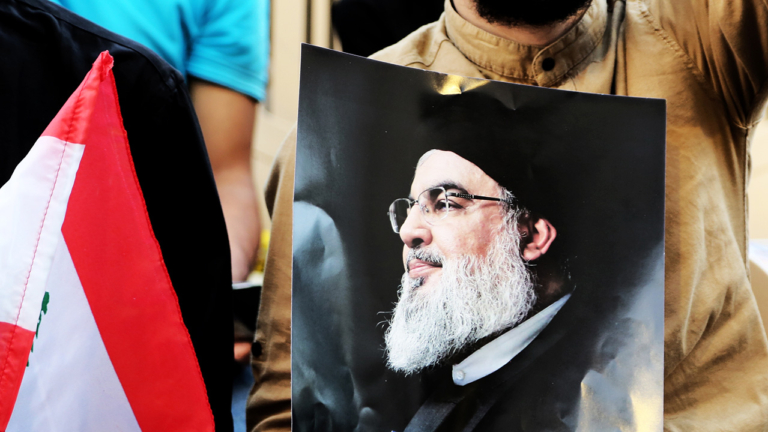
Israel’s killing of Hezbollah’s Secretary General Hassan Nasrallah has shocked many in Lebanon and the region regardless of what they thought of the man and his organization. As a personality, Nasrallah’s charisma was arguably equal to that of late Egyptian President Gamal Abdel Nasser, whose defeat in the 1967 war and death in 1970 sent shock waves throughout the Arab world. It is worth recalling that Nasser’s death and the accompanying blow it dealt to Arab nationalism ultimately led to the 1973 war between Egypt and Syria, on the one hand, and Israel, on the other. In turn, that war began a diplomatic push that culminated in the Egyptian-Israeli peace treaty of 1979 and, over a decade later, in the Wadi Araba peace treaty between Israel and Jordan in 1994. But those peace accords did not alter the state of overall hostility toward Israel in the region, although they changed the region’s strategic structure with Arab regimes appearing to abandon the state of war with the Zionist state.
Instead, the regional strategic picture saw the advance of non-state actors. Following the expulsion of the Palestine Liberation Organization from Lebanon after the Israeli invasion of Lebanon in 1982, Hezbollah sprang as an organization dedicated to fighting Israel. A few years later, the Islamic Resistance Movement, Hamas, began to challenge Israeli occupation, specifically in Gaza, and compete for prominence in Palestine. Roughly two decades later, Ansar Allah in Yemen, also known as the Houthis, and several Iran-supported groups in Iraq, showed a clear expansion of non-state actors that coalesced around an Axis of Resistance to Israeli occupation led by the Islamic Republic of Iran.
Nasrallah’s assassination poses serious challenges to the Axis of Resistance, Arab regimes, and United States foreign policy in equal measure.
There is no doubt that Hezbollah is already trying to put its house in order. The party has not yet chosen a replacement for Nasrallah, but Hashem Safieddine, the head of its politburo, is the strongest candidate for the post. Hezbollah will soon announce a new military strategy that is most likely to emphasize continuing the war with Israel. However, the party will most assuredly address obvious security breaches that led to the near decimation of its leadership, both military and political, in addition to Nasrallah. There is an obvious dependency on western technology that has worked against the party over the last few weeks. Communication devices were used by Israel to devastating effect against party cadres, which necessitates a switch to local and trusted manufacturers who can deliver new devices quickly. A long-term political strategy will also have to accompany the military one; to wit, what are the political goals that are realistically feasible, given the current strategic and political equation, both in the region and globally?
Arab regimes, whose militaries have in effect been neutralized as far as the Israel-Palestine conflict is concerned, will have to reassess their political goals for the future. Those regimes that have “normalized” their relations with Israel have to conduct a cost-benefit analysis of their recent choices in light of the fact that said normalization has not produced what would be a redress of Palestinian rights. Those regimes that have stayed away from the present conflict in the Levant between Israel and Hamas and Hezbollah will have to reassess their roles within the Arab League and the United Nations as historically concerned with what happens to the Palestinians. With pervasive unhappiness with what appears to be a general deterioration in Arab standing vis-à-vis Israel and the latter’s free hand, with American help, in the Middle East, many regimes may be worried about internal upheaval orchestrated by now dormant social and political forces looking to redress past and current grievances.
Finally, and perhaps most importantly, American foreign policy will need to be reassessed—perhaps not just toward the Middle East but around the world. The Biden administration was inaugurated with the stated goal of putting diplomacy first, but this has fared poorly in the face of violent outbreaks in the Middle East and Ukraine. Relations with China are not promising, if looming confrontations in the south China waters are any indication. More to the point now, Israel is on a war path and its right-wing government is out to take advantage of recent military adventures in order to establish a new order in an already troubled region. An American laissez fair attitude toward Israel’s ambitions is reckless and dangerous, not least of all to US interests in the Middle East. The root cause of the problem in the recent outbreak of violence in the Levant remains the question of Palestine and the future of Palestinians in the Gaza Strip and the occupied West Bank. A lasting solution to that problem requires new thinking in Washington and a firm resolution to make serious effort toward implementing long proposed peace plans and not just making announcements and declarations about peace that are timed according to the schedule of approaching elections.
The views expressed in this publication are the author’s own and do not necessarily reflect the position of Arab Center Washington DC, its staff, or its Board of Directors.
Featured image credit: Shutterstock/mohammad kassir

